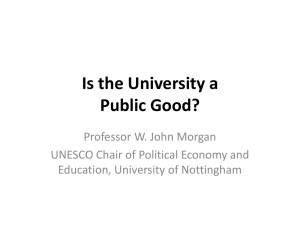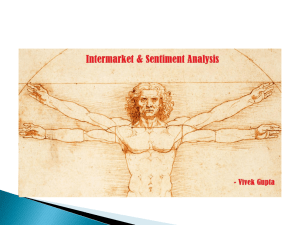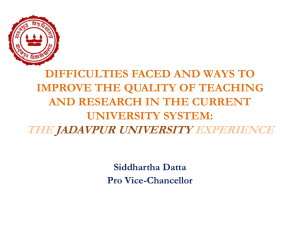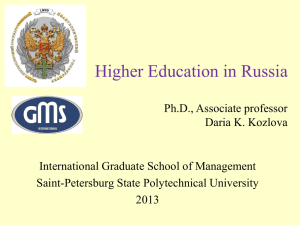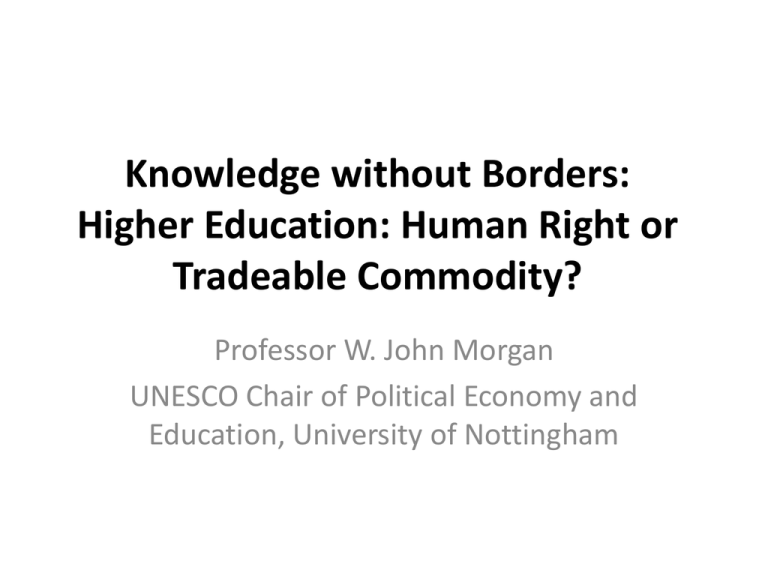
Knowledge without Borders:
Higher Education: Human Right or
Tradeable Commodity?
Professor W. John Morgan
UNESCO Chair of Political Economy and
Education, University of Nottingham
The Idea of Human Rights
• This asserts that all persons have an
equal right to the same treatment-regardless of differences in race,
ethnicity, language, religion, sex, politics,
physical capacity or social or economic
status.
• Such differences are seen as ethically
irrelevant and do not affect the essential
nature and worth of a person.
Natural Rights and Special Rights
• Human rights or natural rights must be
distinguished from the special rights that
arise from a legal contract, a constitution,
a particular relationship e.g. Parenthood.
• Special rights apply only to those who
fulfil certain conditions e.g. signing a
contract, being a citizen, having a child.
• The former are unconditional; the latter
conditional.
Rights and Obligations
• Rights bring with them correlative
obligations.
• Rights must be respected & fulfilled.
• Individuals & groups must have the
liberty to exercise rights.
• Human rights relate to those liberties
which are essential to a human quality of
existence.
• Special rights bind relationships.
Human Rights & Society
• Human rights are not culturally relative
but universal & inalienable.
• Human rights & obligations morally bind
people together in a commonly
supportive society i.e., for the public
good.
• Human rights are not granted for purely
utilitarian ends.
Universal Declaration
of Human Rights
• Proclaimed on 10th December 1948.
• Comprises a Preamble & 30 Articles.
• It is not legally binding, but a starting
point for establishing common
international norms & standards.
• However, governments can & do
interpret the Declaration in different
ways.
Article 26
• Everyone has the right to education.
• Education shall be free, at least in the
elementary & fundamental stages.
• Elementary education shall be
compulsory.
• Technical & professional education shall
be made generally available & higher
education shall be equally accessible on
the basis of merit.
Debate on Human Rights
• Debate & dispute arise over the extension of
human or natural rights and how they are
distinguished from special rights.
• Is there a natural human right to education
as distinct from a special right?
• If so, how much education, of what type,
and how should it be financed? This
necessarily brings in utilitarian
considerations.
What is the Public Good?
• The modern university has evolved in parallel
with changing definitions of the utilitarian
concept of the public good.
• According to early liberal theory, for instance, J.S.
Mill, it was a good provided either because it was
of benefit to the community as a whole e.g.
street lighting or drainage or could or should not
be provided privately e.g. national defence.
• As states and societies became more complex in
terms of regulation and of welfare provision so
the definition changed.
What is the Public Good?
• Policies were justified as claims upon public
wealth either because of the specific benefits
provided to recipients identified as being in need
of state support e.g. student grants or because of
the general benefits perceived for society as a
whole e.g. an educated population.
• This was the dominant view that paralleled and
supported the growth of the modern university.
What is the Public Good?
• Neo-liberalism has challenged this.
• It argues that, economically, private
investment and provision produces outcomes
that are superior to those of public investment
and provision.
• It argues also that, morally, individuals (and
communities) should have the choice that this
alternative provides. Education may be thus
be seen as a tradeable commodity.
What is the Public Good?
• Neo-liberalism argues that the combined social
benefit from economic efficiency and choice
leads in practice to a greater aggregate public
good.
• It does not, however, take into consideration the
impact on normative issues such as equality and
social justice.
• What is the effect of this on the relationship
between the contemporary university and the
public good?
The Contemporary University
• The contemporary university may be said to
have three basic social functions. These are
its contributions to:
• Human and social development in all its
forms.
• Knowledge and learning societies.
• Economic development and employment. This
includes entrepreneurship and social
entrepreneurship.
The Contemporary University
• There is no longer a single organizational
model. This raises questions of quality,
relevance and capacity.
• The need for social cohesion means that
public policy should ensure that the university
is inclusive of all in society.
• This does not mean the same provision for all,
but it does mean provision of opportunity for
education of high quality whatever the target
group.
Higher Education as a tradeable
investment commodity
• The economics of higher education are based on
the theory that it enhances human capital
through developing individual knowledge and
skills beyond embodied capacities.
• Such enhancement is the main economic benefit
of the university to individuals. It is why students
enrol and give of their time and resources. They
expect a private return on what is seen as a
purchase of a tradeable investment commodity.
Higher Education as a tradeable
investment commodity
• Such returns are not simple of calculation and
require sophisticated econometrics even to
produce reasonable approximations.
• Essentially, however, students and their families
invest in university education with a view to
enhancing their career prospects.
• Some professions carry with them more
vocational appeal and potential social benefit
than others e.g. teaching or nursing. This skews
attempts at calculation.
Higher Education as a tradeable
investment commodity
• University education also enables its
graduates to build their personal cultural and
social capital which may be of employment
benefit subsequently.
• This considers university education as a
private investment good rather than a private
consumption good. This is not to deny the
considerable consumption benefits to
individuals.
The State and Higher Education
• It justifies, in part at least, public subsidies to
students and to providers i.e. universities and
colleges.
• The public also expects a return on its
investment in terms of the contribution of
higher education to economic and social
development generally.
• This is the social return or the public good.
The State and Higher Education
• Governments can provide, subsidise, contract
or regulate higher and university education.
• As stated, they also invest in it for the
economic, social and cultural benefits it is
believed to bring to nation-building and to
sustainability.
• However, much of this is found in indirect and
intangible social benefits and externalities
which are very difficult to calculate.
Higher Education & the Public Good
• It is claimed that higher education:• Raises the productivity and incomes of all
employees through knowledge transfer.
• Promotes technical change through research and
development.
• Increases allocative efficiency and labour
flexibility and mobility.
• Cultivates social cohesion, community values and
stability.
Higher Education & the Public Good
• The employability of graduates is key to a
healthy higher education system and to the
contemporary public good.
• This is related to the quality of teaching; and
to capacity for research and development
• The university in particular has also a
complementary responsibility to the public
good through contributing to cultural and
social cohesion.
Higher Education & the Public Good
• The university is both a creator of and
repository of knowledge;
• and the incubator of sustainable economic
and social development;
• and of intellectual and moral leadership;
• Each of these has local, national and
international or global dimensions.
Higher Education & the Public Good
• This was recognized by UNESCO at the World
Conference on Higher Education in Paris,
2009. The communiqué concluded that the
strategic role of higher education in human
sustainable development was:
• ‘…crucial, and all the more so as we navigate
through the economic crisis. Higher education
systems must be expanded and strengthened
to provide learning opportunities to all
students regardless of their background.’
Higher Education & the Public Good
• In recent years there has been a re-consideration
of the public role of higher education and of the
university in particular, and of the related issue of
graduate employability.
• However, under the influence of neo-liberalism,
this has emphasized the economic and market
function of the university, rather than its social
function. Certain questions deserve more
consideration:-
Universities Week survey reveals the public are
in the dark when it comes to universities
A new Populus survey undertaken to launch Universities Week
2010 has revealed that the British public knows surprisingly little
about universities in the UK. Only one in five people know
approximately how many universities there are in the country, and
one in six people do not rate them as major local employers.
Less than one-in-five people recognise the wider impacts
universities have on society.
“
”
The public role of universities is hotly
contested
– ‘public’ vs ‘private’ benefit
– ‘market’ vs ‘social’ value
– ‘applied’ vs ‘abstract’ knowledge
– ‘academic freedom’ vs ‘regulation’
Discussion points
• Can we resolve the dilemma of Higher Education
being both a special human right and a tradeable
investment commodity? If so, how?
• How do we prepare graduates for employment
that is both economically rewarding and socially
useful?
• What are the consequences of the growing
relationship between publicly funded higher
education and the private and corporate sectors?
• How should universities communicate their
purposes to ensure wider societal support and
understanding?
Thank You!
•
W. J. Morgan
•
john.morgan@nottingham.ac.uk

